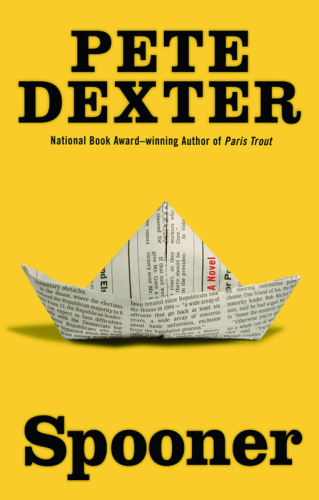
Spooner
کتاب های مرتبط
- اطلاعات
- نقد و بررسی
- دیدگاه کاربران
نقد و بررسی

June 15, 2009
What can you do when your twin brother, dead at birth, is your mother's favorite? This is only one of the burdens placed on young Warren Spooner, the hero of National Book Award–winner Dexter's calamitously funny and riotously tragic new novel. Spooner, who tends toward a life of criminal mischief, turns out to be a baseball phenom, but after an elbow injury puts an end to his pitching career, he ends up a newspaper reporter in Philadelphia, where he's so universally disliked that firing him is at the top of his editor's to-do list. Spooner eventually settles down, becomes a columnist and published novelist, and starts a family. He is dogged, though, by a combination of bad luck and bad judgment, and eventually retreats to Whidbey Island, off the coast of Washington State, where he learns that good fences don't necessarily make good neighbors. Spooner's story is juxtaposed with that of his stepfather, Calmer Ottosson, a naval officer turned high school principal, whose dedication to his family is in direct contrast to his stepson's bellicose adventures. Although raggedly plotted, the rambunctious narrative is filled with hilarious scenes, including a naval burial at sea that goes horribly awry, a literary luncheon featuring Spooner and Margaret Truman that ends with a stampede of little old ladies, and a misguided act of vengeance that backfires and puts Spooner in the hospital. The novel's premise—that life is one big vale of tears and that writing about it wittily and exuberantly is the best one can do—might not work in real life, but it pays off in spades for Dexter and his tragicomically conflicted alter ego.

July 1, 2009
From Dexter (Train, 2003, etc.), a rambling, improvisatory narrative of a not-terribly-compelling life.
Warren Spooner arrives in unpromising circumstances, after his mother labored for 53 hours and his"better-looking" twin brother was born dead. On the very same day (Dec. 6, 1956), Congressman Rudolph Toebox coincidentally and conveniently dies, leading to an embarrassing sendoff at sea when his coffin refuses to sink. The two stories cross briefly because the commander in charge of the abortive burial at sea is Calmer Ottosson, who eventually becomes Spooner's stepfather. Throughout the novel, Dexter traces the many stages of Spooner's development. For example, he has to deal with his much more talented step-siblings, like prodigy Darrow (named after the lawyer), who learns both to read and to play chess while practically in the womb. In contrast, Spooner's talent, such as it is, is to piss in people's shoes and to confound the deputy with this anonymous crime. Spooner becomes an indifferent student but, unaccountably, a talented baseball player—until his promise crashes with an injury to his elbow. He then becomes a reporter, again with mixed results. Along the way we witness the uneasy relationship between Calmer, who becomes a teacher when mustered out of the Navy—and later has to investigate a scandal involving remedial students in his school system scoring at the 97th and 98th percentiles on standardized tests—and his stepson, who never experiences much success in anything. Dexter's technique is to roam around his narrative at a leisurely pace, multiplying incidents until the episodic ultimately devolves into the disorganized. And his ham-fisted comic approach involves such hilarity as the aforementioned shoe-pissing and constantly nudging the reader in the ribs in delight at his own cleverness, coining names such as Dr. C. Elmer Cowhurl and the aforementioned Toebox.
Ultimately, and lamentably, we wind up not caring about Spooner's fate.
(COPYRIGHT (2009) KIRKUS REVIEWS/NIELSEN BUSINESS MEDIA, INC. ALL RIGHTS RESERVED.)

Starred review from August 15, 2009
Warren Spooner bears an uncanny resemblance to his creator, National Book Award winner Dexter. Like Dexter, Spooner was raised in Georgia, worked as a newspaper reporter in Philadelphia, and was almost beaten to death in a bar fight. More conclusively, Spooner is also the author of a revisionist Western titled "Deadwood" (1986). Dexter follows his alter ego from childhood to semiretirement on Whidbey Island in Washington. This hilarious fictional memoir has little structure or plot and even less romance. Spooner devotes entire chapters to his favorite dogs but manages only a few dismissive sentences for the shadowy "Mrs. Spooner." Bar fights, bad divorces, car repossessionsthe man's life is a 500-page country-and-western song. The glue that holds it all together is the relationship between Spooner and his stepfather, a cashiered naval officer aptly named Calmer. VERDICT There is too much material here, but it is difficult to see where it could be cut. Dexter's prose is razor sharp, and every page has at least one zinger. The Georgia section in particular will remind readers of the great Harry Crews. Don't miss this.Edward B. St. John, Loyola Law Sch. Lib., Los Angeles
Copyright 2009 Library Journal, LLC Used with permission.

July 1, 2009
Dexters sprawling account of the life of Warren Spooner may be classified as fiction, but it incorporates plenty fromthe authors own history. True, false, it doesnt much matterthis gregarious curriculum vitae is just the ticket for those who like their comic realism served up with a side of Garpian absurdity. As a child, Spooner is outshined by siblings bursting with intellect while he bursts with urges: scab-eating, masturbating, and a compulsion to piss in neighbors shoes that earns him the alias the Fiend of Vincent Heights. From this faintly repulsive youth, Dexter traces his hero through a stab at high-school baseball heroism and then into his career as a writer.The emotional core, however, is Spooners relationship with his cautious yet luckless stepfather, Calmer. A once-promising ship commander whose botching of a sea burial began his slide toward mediocrity, Calmer is the steady path that forever eludes Spooner.But as both men grow older, their emotional fumbling toward each other becomes downright moving. A big, satisfying maybe-memoir.(Reprinted with permission of Booklist, copyright 2009, American Library Association.)

























دیدگاه کاربران